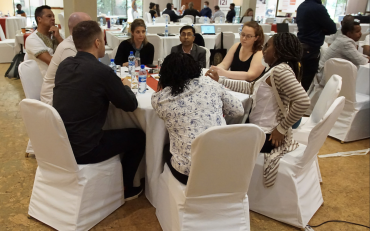On 21 and 22 May 2022, the International Disability Alliance (IDA), in partnership with the African Disability Forum (ADF), the Inclusive Futures consortium, and the United Disabled Persons of Kenya (UDPK) hosted a workshop bringing together IDA members and partners of the International Disability and Development Consortium (IDDC) in an Exchange and Learning Workshop on inclusive programming and meaningful engagement of organizations of persons with disabilities (OPDs).
Inclusive programming aims to ensure the meaningful engagement of OPDs across the program cycle, from project design to governance, budgeting, partnerships with OPDs, data collection, monitoring, evaluation, communication, and safeguarding. Inclusive programming is essential to make way for OPDs to act as key contributors in development and humanitarian action, as foreseen by the Convention on the Rights of Persons with Disability (CRPD), in particular Articles 32 and 4.3. It requires a transformation of organizational actions to ensure that disability-inclusive practices are truly guided by persons with disabilities themselves as right holders, through their representative organizations, OPDs. Inclusive programming requires a shift from seeing OPDs and persons with disabilities as recipients of aid to promoting their meaningful role as contributors and partners, for better ownership and impact of project interventions.
The workshop drew from the learning of the Inclusion Works (IW) consortium project (focused on access of persons with disabilities to employment in Uganda, Bangladesh, Nigeria and Kenya) and invited other partners from IDDC to review what works to transform ways of working towards more leadership of OPDs.
Highlights
Reflections guiding the discussion
The discussions were based on a reflective process taking the following questions into consideration:
- Do development partners have a shared understanding of what is meant by “meaningful OPD engagement” and what this means in practice?
- How can development partners challenge existing power asymmetry between INGOs and OPDs and contribute to “shifting the power” towards more OPD leadership and shared decision making?
- What are good practices to ensure that no one is left behind and that underrepresented groups of persons with disabilities and their representative organizations are counted?
- How can accountability towards OPDs be improved among development partners?
- What more should be done to accelerate change in international cooperation practices towards meaningful OPD engagement?
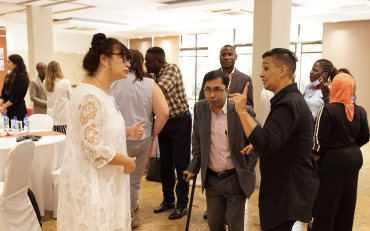
Pamela Molina (WFD) discussing with Rejaul Karim Siddiquee (IDA) with the support of SL interpreter Natasha Maliko
Participants first took stock of the positive trend towards more OPD engagement, as well as the many challenges that remain to ensure that disability-inclusive commitments effectively result in associating persons with disabilities to decision-making. For example, over 55% of OPDs who responded to the second IDA Global Survey on OPD participation reported their influence improved. However, participation is far from being meaningful: preconditions, such as accessible venues, accessible information and communication, positive attitudes, are not ensured. OPDs’ capacities and resources are also stretched to the maximum as they have not had equal opportunities to benefit from development efforts.
Participants shared experiences and learning, including case studies of targeted interventions to include most marginalized groups, guidelines to include persons with intellectual disabilities, outputs of country workshops and reflections between OPDs and donors, and other strategies to fuel the search of solutions to promote more active roles for OPDs in projects and programs.
IW OPD engagement mechanism
Under the Inclusion Works (IW) project, IDA and ADF devised a unique mechanism to support greater ownership by the national disability movement throughout the project cycle. To support implementation, national OPD Engagement Officers (OPD EOs) were hired in each of the four project countries to spearhead coordination of OPD inputs into the project, pay attention to participation of underrepresented groups and support program activities that reflect CRPD standards. The positions were hosted within national umbrella federation of OPDs (where it exists) and persons with disabilities with expertise on CRPD and strong connections to the national disability movement were hired in the 4 countries.
Under the coordination of OPD EOs, typical processes were challenged and transformed to be more inclusive, for example:
- Partner selection: an open process for OPDs to be part of the project was launched, with accessible and alternative formats for expression of interest, and a selection panel involving the national OPD federation.
- Project implementation: National Project Advisory Committees were created including OPD partners of the project and other leaders within the disability rights movement. These committees, coordinated by OPD EOs, offered advisory and technical support to the project and served as a platform for OPDs to prepare and share their inputs. This also fostered greater connect and ownership from the larger OPD community on issues of inclusive employment, secured greater buy-in on project achievements, and transformed the vision of the roles OPDs can have in projects.
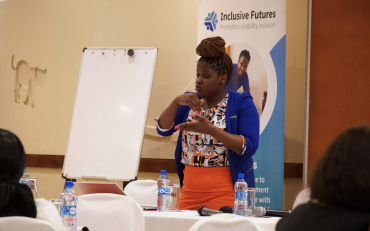
Betty Najjemba (IDA) presenting earlier in the week.
“OPDs have been mobilizing jobseekers for different programmes, with the objective to not focus only on the same few groups. Sometimes it is difficult to reach out to underrepresented groups of persons with disabilities, but through OPDs, persons with deafblindness, persons with psychosocial disabilities can be identified. OPDs can also help in writing their CVs and prepare for interviews,” said Betty Najemba, ADF OPD EO from Uganda.
The Exchange and Learning Workshop was organized as part of the closing of the Inclusion Works project and was primarily led and organized by IDA and OPD EOs, demonstrating the leadership of OPDs in assessing what was achieved, identifying what more could be done or done differently, including benefits of the projects for underrepresented groups of persons with disabilities.
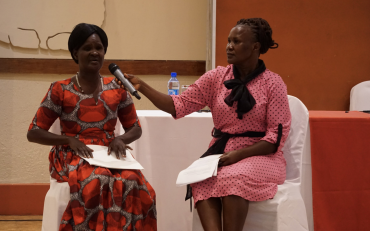
Dorothy Nakato (WNUSP) holding the mic while Agnes Abukito (NADBU) speaks earlier in the week
"My call is as persons with psychosocial disabilities, we are willing to work, and we can perform as long as we are given support and as long as there is acceptance of diversity," said Dorothy Nakato, WNUSP fellow from Uganda.
From these exchanges, participants produced recommendations for inclusive programming. To give a few examples, this ranged from strategic roles for OPDs in project design to coordinating with national umbrella OPDs to respect the roles within the disability rights movement, from ensuring accessible processes for expression of interest to allowing alternative formats for reporting which can lead to more creative and outcome focused communications.
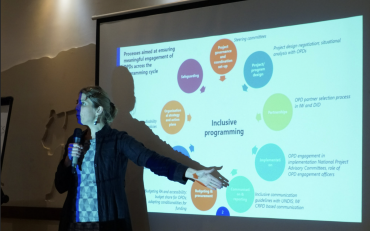
Priscille Geiser (IDA) explaining a PPT slide on Inclusive programming in front of the room.
"When we took part in the first joint workshop of the Inclusion Works consortium, we were invited to come to the room, discovered the agenda the day before, and had no speaking slot. We had to volunteer for a five-minute recap to claim space and draw attention to the need for OPDs to be meaningfully involved in the lead of the project, as the representative voice of persons with disabilities. Today as we convene this workshop to take stock of achievements, OPDs really have a central role. Women with psychosocial disabilities and with deafblindness tell us what works to ensure inclusive employment, a blind activist involved in Business and Disability Networks leads conversations with employers and ministerial representatives. INGOs such as Sightsavers totally transformed their roles and are present here as very complementary technical partners. This is inclusive programming in action,” said Priscille Geiser, IDA Program Director.
What resources, tools and initiatives are available so far on meaningful OPD engagement and inclusive programming?
- CRPD General Comment 7 on the participation of persons with disabilities, including children with disabilities, through their representative organizations, in the implementation and monitoring of the Convention
- Report of the 1st IDA Global Survey on OPD participation (2019)
- United Nations Disability Inclusion Strategy guidelines on Consulting with Persons with Disabilities (2021)
- Global Disability Summit discussion paper on OPD engagement (2021)
- Global Disability Summit Commitments on Meaningful Engagement of Persons with Disabilities (2022)
- Development Initiatives report on county case studies on Stocktaking, analysis and recommendations on donor investment in OPDs level
- Reporting of the 2nd IDA Global Survey on OPD participation (2022) – upcoming
- GLAD Country Case Studies (Kenya, Nepal) and GLAD Country Workshop reports (Kenya, Nepal, Bangladesh) on donor investment in OPDs
